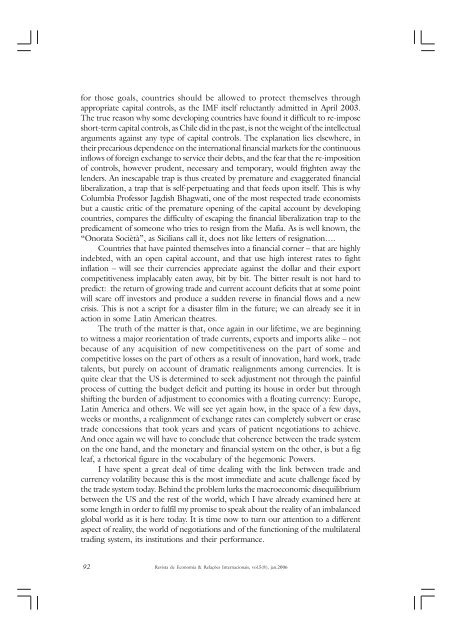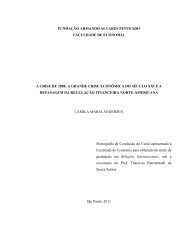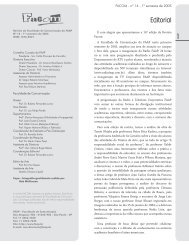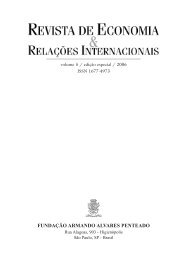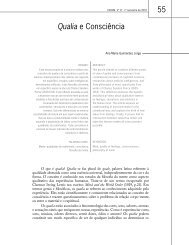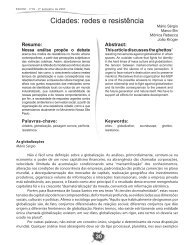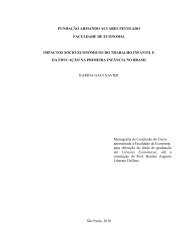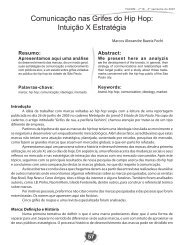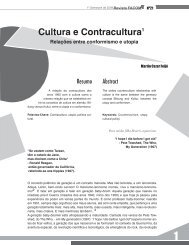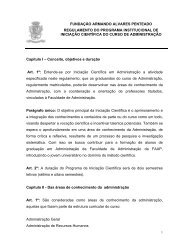Número 8 - Janeiro 2006 - Faap
Número 8 - Janeiro 2006 - Faap
Número 8 - Janeiro 2006 - Faap
Create successful ePaper yourself
Turn your PDF publications into a flip-book with our unique Google optimized e-Paper software.
for those goals, countries should be allowed to protect themselves through<br />
appropriate capital controls, as the IMF itself reluctantly admitted in April 2003.<br />
The true reason why some developing countries have found it difficult to re-impose<br />
short-term capital controls, as Chile did in the past, is not the weight of the intellectual<br />
arguments against any type of capital controls. The explanation lies elsewhere, in<br />
their precarious dependence on the international financial markets for the continuous<br />
inflows of foreign exchange to service their debts, and the fear that the re-imposition<br />
of controls, however prudent, necessary and temporary, would frighten away the<br />
lenders. An inescapable trap is thus created by premature and exaggerated financial<br />
liberalization, a trap that is self-perpetuating and that feeds upon itself. This is why<br />
Columbia Professor Jagdish Bhagwati, one of the most respected trade economists<br />
but a caustic critic of the premature opening of the capital account by developing<br />
countries, compares the difficulty of escaping the financial liberalization trap to the<br />
predicament of someone who tries to resign from the Mafia. As is well known, the<br />
“Onorata Sociètà”, as Sicilians call it, does not like letters of resignation….<br />
Countries that have painted themselves into a financial corner – that are highly<br />
indebted, with an open capital account, and that use high interest rates to fight<br />
inflation – will see their currencies appreciate against the dollar and their export<br />
competitiveness implacably eaten away, bit by bit. The bitter result is not hard to<br />
predict: the return of growing trade and current account deficits that at some point<br />
will scare off investors and produce a sudden reverse in financial flows and a new<br />
crisis. This is not a script for a disaster film in the future; we can already see it in<br />
action in some Latin American theatres.<br />
The truth of the matter is that, once again in our lifetime, we are beginning<br />
to witness a major reorientation of trade currents, exports and imports alike – not<br />
because of any acquisition of new competitiveness on the part of some and<br />
competitive losses on the part of others as a result of innovation, hard work, trade<br />
talents, but purely on account of dramatic realignments among currencies. It is<br />
quite clear that the US is determined to seek adjustment not through the painful<br />
process of cutting the budget deficit and putting its house in order but through<br />
shifting the burden of adjustment to economies with a floating currency: Europe,<br />
Latin America and others. We will see yet again how, in the space of a few days,<br />
weeks or months, a realignment of exchange rates can completely subvert or erase<br />
trade concessions that took years and years of patient negotiations to achieve.<br />
And once again we will have to conclude that coherence between the trade system<br />
on the one hand, and the monetary and financial system on the other, is but a fig<br />
leaf, a rhetorical figure in the vocabulary of the hegemonic Powers.<br />
I have spent a great deal of time dealing with the link between trade and<br />
currency volatility because this is the most immediate and acute challenge faced by<br />
the trade system today. Behind the problem lurks the macroeconomic disequilibrium<br />
between the US and the rest of the world, which I have already examined here at<br />
some length in order to fulfil my promise to speak about the reality of an imbalanced<br />
global world as it is here today. It is time now to turn our attention to a different<br />
aspect of reality, the world of negotiations and of the functioning of the multilateral<br />
trading system, its institutions and their performance.<br />
92 Revista de Economia & Relações Internacionais, vol.5(8), jan.<strong>2006</strong>


